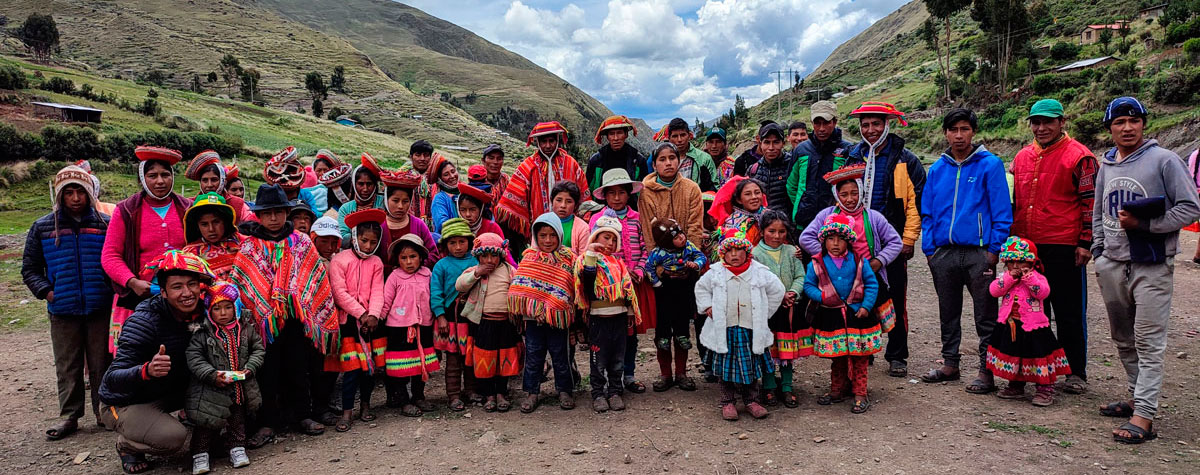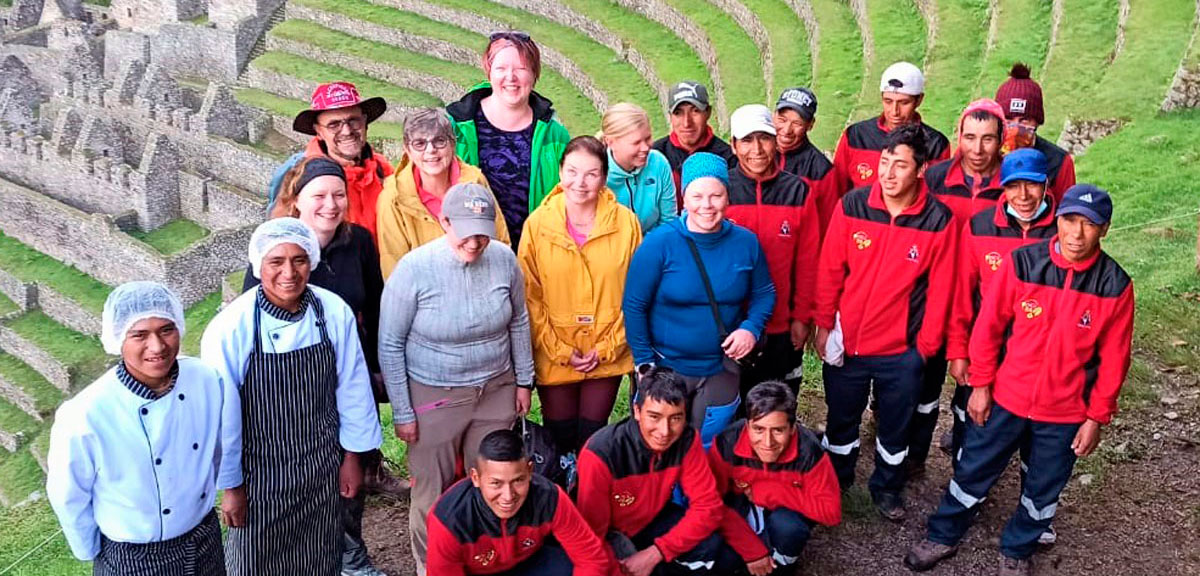
The porters are people who are dedicated to driving or transporting luggage, belongings, food, among other items for personal use that tourists and expedition members of the Inca Trail carry.
Inca Trail porters are one of the most important people on the route to the Inca Trail to Machu Picchu and perhaps the least understood by both tourists and the operating agencies of the route to the Machu Picchu sanctuary.
The Inca Trail porters are people endowed with great strength since on their backs they carry everything necessary for our trip, a particularity of the porters is that they are the last to leave our camp because they have to dismount and keep the tents, and all the implements for your trip to Machu Picchu
And they are the first to arrive at the new camp, since when a traveler arrives almost everything is ready, such as the armed tents, the armed kitchen tent, the dining tent, etc.
At times the Inca Trail porters trot during the tour, surpassing the travelers, this shows how impressive their physical strength is.
Unfortunately, some, not all the tourist companies operating the Inca trail do not give them the importance they deserve, so they DO NOT provide them with adequate clothing to carry out their work, they overload in weight, and they do not provide them with special equipment to carry them. things, they are given a very low remuneration and especially very, very poor food and it is as a result of this that you will be able to see porters thirsty, hungry, and with low morale on the Inca Trail.
The government of Peru has created a law, the porter's law, whereby operating agencies are obliged to give the appropriate conditions to porters, but unfortunately many do not comply with it.
One of the best ways to support the Inca Trail porters is by leaving them tips, this causes them to raise their salaries and many porters pay for food and their family's education with the work they do.
We must point out that the "Porteador" is the most important worker of the entire team of professionals, who will accompany you during your walk along the Inca Trail, this support staff is responsible for setting up the camp that has to be ready upon arrival. of the group; however, they leave at the same time as the tour group and carry more weight (14 kg).
During the walk the porters go at a brisk pace, they pass the groups, even some sections do it running, in this way they manage to get ahead and fulfill their work in a timely manner.
The new law requires that the new salary that porters make for an entire four-day trip is 168 USD, which is more than double what they earn in 2022. Also, Tour operators must provide porters with a health insurance plan, AFP (pension fund), and provide an accident insurance policy.
According the new Peruvian law N° 27607-2022, the porters should receive the following payment:
| Trekking Chef | Per Trip | Per Month |
|
Porters Job: 8 hours + AFP (Pension Fund) |
S/ 717.60 | S/2152.80 |
| Health Insurance | S/193.75 | |
| Life Insurance | S/ 55.00 | |
| Work risk insurance | S/ 60.00 | |
| Total: | S/2461.55 | |
Total in U$ 703.30 per Trekking Cook
| Porters | Per Trip | Per Month |
| Porters Job: 8 hours + AFP (Pension Fund) | S/ 552 | S/ 1656 |
| Health Insurance | S/149 | |
| Life Insurance | S/ 55 | |
| Work risk insurance | S/ 60 | |
| Total: | S/1915 | |
Total in U$ 547.14 per porter
The tourist use of the Inca Trail, intensified in the 80s, at this time, the first porters began to work in a time, in which, there was no regulation of use of the Inca Trail and therefore, there was also an abuse of Inca Trail porters, who were exploited, carrying a lot of weight (40 kg. in extreme cases), were not given adequate footwear, or adequate clothing for the temperature changes typical of the area and did not eat like the passengers. And as if that were not enough, they were very poorly paid.
In 2002, GERCETUR - Regional Directorate of Foreign Trade and Tourism, INRENA - National Institute of Natural Resources and other institutions, issued the "Tourist Use Regulations of the Inca Trail network of the Historic Sanctuary of Machu Picchu". In said regulation, they considered the porters as Support Personnel, they regulated their employment situation and decent working conditions.
Among other aspects, the regulation considers the following points.
The maximum weight that a porter can carry on the Inca Trail to Machu Picchu has been limited to 20kg, this includes your personal items of 5kg. Each porter is weighed at the beginning of the tour and again in Wayllabamba at the beginning of the second day.
This regulation was introduced in 2022 and has been strictly enforced. Companies that violate this law receive fines and the risk of losing their licenses. However, as with most regulations, many companies go to great lengths to not comply with them.
The biggest difference between a responsible society and an irresponsible one is how to take care of its carriers on the journey. Many porters are given very little to eat on the way. They have to wait to see how much the tourists have eaten according to how the leftovers are divided among them. Remaining many Inca Trail porters at the end of the road tired and hungry. Generally, the porters sleep together in the group dining room and kitchen tents.
The Quechua race has a history of being oppressed, first by the Incas, then by the Spanish, and then by landowners. Only in the relatively recent reforms have the Quechua people began to own their own land. Due to their long history of being dominated by many others, they have low self-esteem. It is important on the Inca Trail to try to get involved with the porters in your group. Grab some coca leaves to share with them and try to learn a couple of basic Quechua words (the guide will be happy to help you). Many of the porters have incredible stories to tell about the traditions and life in their villages. At the end of the walk don't forget to show them that you appreciate their work and value their contribution to the walk by verbally thanking them and giving them a tip.

Tips to the guide and cook should depend on the quality of the service he received and his will. However, even if you think the food was terrible and the guide did not speak or explain well (which we hope is not the case), the porters were probably the ones who worked a lot carrying the camping equipment and tents, so do not ask yourself. forget to leave a tip. The amount is up to you, but as approx. It is recommended that each porter in your group bring home an extra 40 to 45 dolars. Try to take a lot of small changes so that you can tip the porters directly. This is much better than giving the money to the cook or guide who is later divided among the porters so often the money is misallocated.
Without a doubt, for many visitors to our country Peru, after having reached the great archaeological center of Machu Picchu and above all having made the Inca Trail is the highlight of their trip. For others it is the realization of a dream of always. No matter what your religious beliefs, social, economic status, the Inca Trail is really a special excursion that passes through spectacular mountain landscapes, beautiful cloud forests, orchids and hummingbirds. Dotted with Inca archaeological centers, until finally reaching the mysterious and magical city of Machu Picchu at dawn through the INTI PUNKU or Puerta del Sol. Visitors cannot help but feel deep inner satisfaction and a sense of personal fulfillment in completing this journey. Some people say that this feeling is enhanced by the spiritual energy derived from the sacred stones of Machu Picchu.
However, and this is true, that this positive feeling is much greater knowing that you have not contributed to the EXPLOITATION of the porters who helped you reach your goal by carrying all the equipment of the excursion.
Most of the Inca Trail porters are from the countryside, simple farmers who supplement their income by working on the Inca Trail. Their mother tongue is Quechua, the official language of the Incas, although many speak Spanish. In fact, most of these people are still Quechua thoroughbreds, the people who were ruled by the Incas almost 500 years ago. Many of their traditions and beliefs have not changed since long before the arrival of the Spanish. However, most know that these people have remained a quiet and humble people, being easily manipulated by governments and tour operators who have found them (due to their need) in objects of exploitation at least in the Inca Trail network.
To collaborate with the Inca Trail porters and watch over their work. We must take into account the following recommendations:
Personal porters are optional and can carry your belongings. Since they are also included in the limit of 500 people per day, it is strongly recommended to add them at the time of booking. Your role is simple: carry your belongings, whatever they may be, during the 4 days of the trek. In general, they carry their personal effects, the sleeping bag (rented or not), the insulating mattress (included in the price). Like the content, the shape and the amount of luggage is not important. For example, you can give them 1 backpack, or 2 cloth bags, or 3 sacks. There is only one restriction for porters: the maximum weight they can carry is 15 kilos.
It should be noted that the porters do not walk together with the rest of the group during the trek. They leave in the morning when the camp is up and walk faster, to arrive before lunch. The same applies to the afternoon. That is why you should not entrust the porters with the belongings that you need during the walk itself, such as water, cereal bars, hat, camera, etc.
The number of contracted personal carriers is unlimited. For example, if you are 3 hikers, you can choose to take 1, 2, 3, 4 porters. Carriers can also be "shared" by dividing the load of the carrier among several; this is done, for example, for children or adolescents when only one carrier is shared among several.

As mentioned above, the porters are part of the maximum limit of 500 people per day for the trek. Since places sell out quickly, we recommend that you choose the porters when you make your reservation online. If you decide to add a personal porter after your reservation, there must be spaces available. However, if you are lucky, you can sometimes "get back" the group carrier from another trekker who has canceled their trip, as our Agency would release the carrier assigned to that person.
Lastly, please note that since the porters are booked, assigned and paid immediately after your reservation, it is not possible to cancel them afterwards.
Entrance tickets to the Inca Trail must be reserved with a minimum of 5 or 6 months before. However, if you plan to visit during May, June or July; You must make your Inca Trail book 2024 at least 7 or 8 months in advance.
2 day Inca Trail tickets are not that hard to get. It is recommended to make the reservation weeks in advance. In the months of May, June or July; try to reserve a month before.
How to book the Inca Trail 2024
The following Inca Trail trekking companies have received consistently good reviews:
